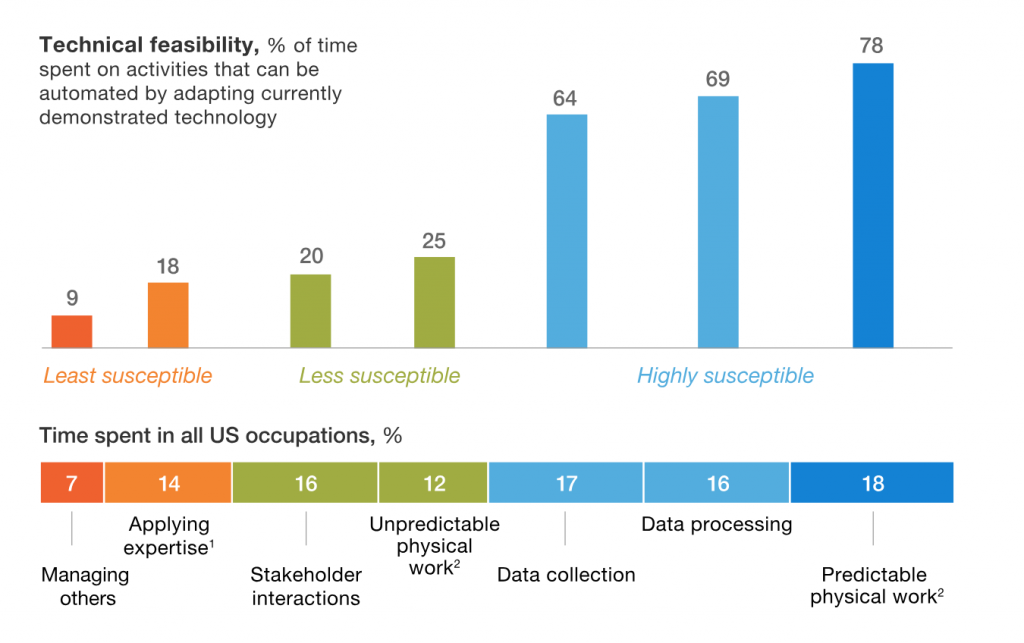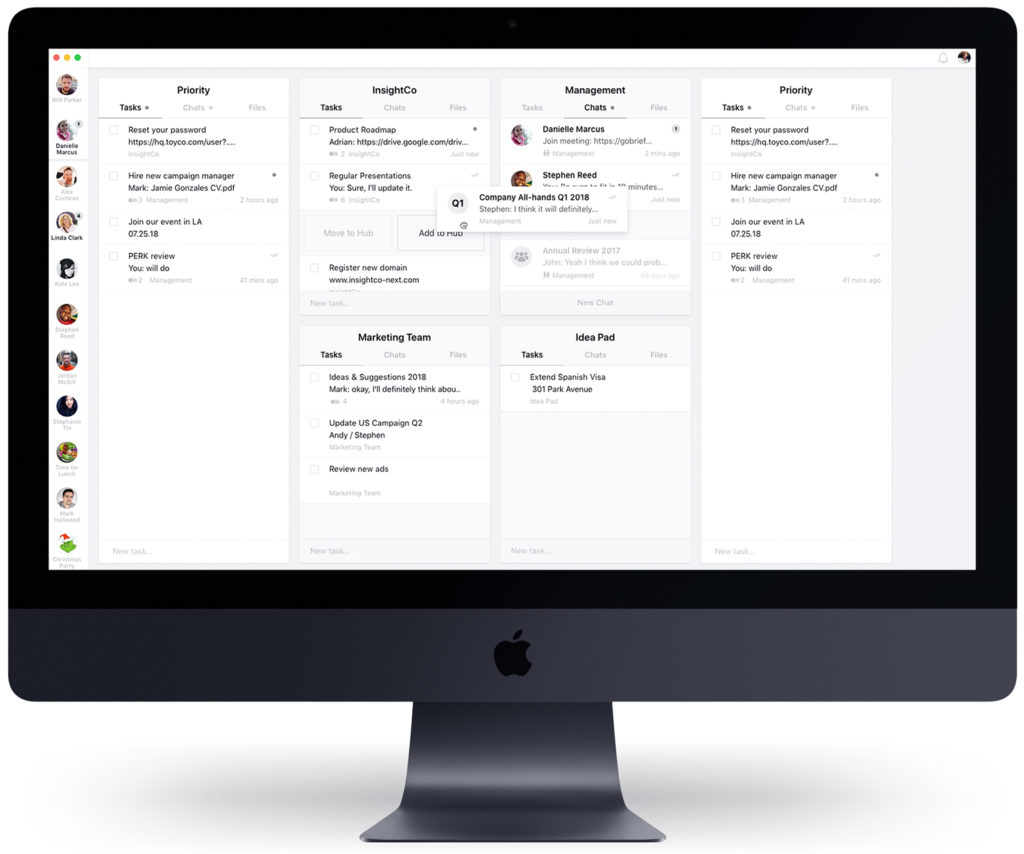Have you used a self-checkout machine at your local supermarket recently, asked Alexa what the weather was going to be today, or used a pay-by-the-minute electric city car? Automation is here. It’s already impacting jobs and could wipe out as many as 73 million U.S. jobs by 2030. Before you recoil in shock, rest assured that is also a plethora of new jobs that will also be created due to automation itself. The key is to check your skills — are you ready to thrive in the future of work? Let’s take a look at what skills you’ll need:

We can see that the activities most susceptible to be replaced by automation are those that involve repetitive tasks or data crunching, all of which will be best left to computers. Activities that require expertise, emotional intelligence and creativity are far less susceptible to be replaced by artificial intelligence.
You may recall that this is not the first time the rise of AI or robots has left societies concerned at large. Many jobs have disappeared over the years; telephone operators, gas-pumpers, elevator attendants, film projectionist, and bridge toll collectors, to name just a few. In 1961, President John F. Kennedy said automation ranks first as a job threat. What an evergreen prophecy! But the loss of some jobs and creation of others has gone on for centuries. Researchers say there is no reason to believe this next wave of automation and AI integration will be any different.
Since it’s hard to predict with certainty what the jobs of the future will look like, what we can do is break it down by skills.
What skills do we need for the future?
By 2020, “more than a third of the desired core skill set of most occupations will be comprised of skills that are not yet considered crucial to the job today,” according to the World Economic Forum.
The same report found that 65 percent of the jobs our elementary school children will be doing in the future, don’t even exist today. So how can we prepare for the unknown? Depending on which think tank, business professor or economist you talk to, the skills of the future vary. Here are ten they all agree on:
1. Critical Thinking
Future workers will need to have web and critical thinking as opposed to linear thinking. This involves analyzing various situations, considering multiple solutions and making quick decisions using logic and reasoning.
To think critically is to see the big picture and look at trends broadly. A skilled worker or leader of the future has to be able to have solution-centric thinking, while going beyond what has already been presented to them, or done in their industry. Elon Musk would never have pushed so far with his electric vehicle, solar energy, or space exploration ideas had he not had this key skill. He pushed ahead despite what the criticism and he drew inspiration from other trailblazers who thought critically.
“When Henry Ford made cheap, reliable cars, people said, ‘Nah, what’s wrong with a horse?’ That was a huge bet he made, and it worked,” Musk said.
Grow confidence in expressing your radical ideas. It may seem too fringe at the moment, but don’t all great ideas start like that?
2. Leadership and People Management
This vital skill could not be more important in your future career. As more teams become dispersed and flat hierarchy becomes the norm – the ability of a leader to motivate dispersed and culturally different people forward towards a goal is paramount. Yes, robots may learn analytical skills, but their ability to motivate and inspire humans is still lacking – and some may say – will never be able to fully replace this human skill.
Leaders need to be more focused on strengthening the team around them to achieve company results vs. focusing only on what they can personally do to achieve their own goals. These great managers will look at the overarching need and with input from the broader team, come up with a solution instead of dictating what the team needs.
3. Creativity
Robots may already be able to write poems, songs, and articles, but the results aren’t foolproof just yet. Humans are still the masters of abstract and out of the box thinking when it comes to creating original content.
As automation makes certain repetitive tasks more and more the domain of machines, human creativity is flourishing. It has never been easier for a person to sell their creations on Etsy, fund their radical product idea on Kickstarter, write their own personal health or fashion blog or get recognized for their incredible photography on Instagram.
Being creative is advantageous, especially with future work. German philosopher Friedrich Nietzsche believed that one’s life and the world should be viewed as a work of art — think creatively and express your ideas. As a leader of the future, stimulate and encourage the value of curiosity. Express a “what if” openness to your team.
4. Virtual Collaboration
The ability to collaborate effectively and productively with virtual teams while demonstrating presence, engagement and understanding of concepts and tasks quickly. With virtual and global teams, another essential skill is the ability to understand and operate effectively, while embracing distance (the lack of face-to-face engagement), and the sensitivities that can be involved with remote communication
Productivity and communications tools like Brief can help teams stay on the same page and work towards a common goal. Instant messaging is overtaking email as the communication tool of choice at work. With Brief, you can bring together a virtual, culturally diverse team, that is a mix of individuals in the same office, across different offices or even, across different geographies – and they can feel like they are all sitting together in one room.
Here at Brief, we are spread across more than five time zones. Some of us have never even met each other face-to-face but you’d never know that based on our camaraderie, team effectiveness, and output. We infused Brief with that same objective — it’s a productivity and communications tool that will power the teams of the future. A true leader knows how to unite a team together under one banner and get work done in a focused and timely manner, and needs the proper tools to do so.
5. Social and Emotional Intelligence
In a world where many people have thousands of ‘friends’ and tens of thousands of ‘followers’, the ability to sincerely and genuinely connect with others has become more valuable than ever. This requires skills such as curiosity, focus, empathy and understanding. These are all particularly important skills for managers and CEOs.
As communication within teams or between companies becomes more globalized, we convey messages more instantly and with fewer and fewer words (and perhaps a few emojis). A lengthy email is now a short two-sentence instant message. A high level of social and emotional intelligence is needed to translate key social skills in digital transactions. A message can be understood in a completely different way if the sender does not take the time to understand the nuances of instant messages across cultures and teams. Working effectively across cultures and geographies requires even more subtlety, finesse and professionalism. In this environment, having different leadership styles in an organization can be a huge asset.
A leader with a high EQ tends to have greater empathy, allowing them to have an understanding of what isn’t working within their teams and to fix it faster.
6. Design Thinking and Design Mindset
Design thinking is the ability to think iteratively while seeking to understand the user and the industry space you are operating in. Instead of linear thinking, design thinking is about constantly looking for improvements and being able to pivot on ideas or concepts, quickly. If you notice an idea is not working as well as you originally thought, or that the industry game changed so quickly that your expected outcome has become obsolete before you even had time to launch your idea, design thinking helps you quickly adjust to stay ahead of the curb.
It’s not about doing task A, B, C, D and then you sign off, but instead, it’s doing A, B, A, C, D, B, B, D, A and so on. Sometimes, all it takes is looking at the task from a different angle and with fresh eyes to see something that was right there all along. There’s no wonder that design-centric businesses tend to significantly outperform their peers.
7. Cognitive Flexibility
As jobs of the future won’t require just one skill set, people need to be agile and flexible in not only their thinking but also, the type of work they are prepared to do in a given day. This means being able to swap between various mindsets based on the task at hand. Leaders of the future have to be nimble and move seamlessly between various tasks. Today’s modern workplace already calls for this skill, but with the rise of further automation, the convergence between man and machine, and an always-on digital work environment — it’ll become even more vital.
8. Negotiation
With many expected changes across various industries, it’s essential for managers and executives to reach win-win solutions with other businesses. This ensures longevity, continued business transactions and a healthy bottom line.
Negotiators with patience and persistence have the ability to convince others without using manipulation. This is important to maintain a positive atmosphere, particularly during difficult negotiations where it may be harder to get buy-in from another team or client.
With Brief, effective communication is at our core. Teams can stay on the same page by having all their Tasks for the week, month and year in Hubs. If you need to add a new task or make changes, negotiate these changes effectively with your team via Brief.
9. Trend Spotter
Another important skill for future career success is the ability to recognize new business opportunities early. It gives companies a competitive advantage and allows them to constantly reshape and adjust their businesses in a timely manner. A manner that will either mean they either keep reinventing themselves for success or they die fast and furiously.
When YouTube first launched in 2005, it was not the video sharing platform that it is today. It actually started as a video dating website with the unofficial slogan “Tune In, Hook Up.” Well, that didn’t last long. It failed to gain traction and even offered women $20 to sign up to the dating platform.
“It didn’t even matter. Our users were one step ahead of us,” said YouTube co-founder Jawed Karim. “They began using YouTube to share videos of all kinds. Their dogs, vacations, anything. We found this very interesting. We said, ‘Why not let the users define what YouTube is all about?’ By June, we had completely revamped the website, making it more open and general. It worked.”
By spotting the trend and seeing what the users wanted, YouTube made a critical and timely pivot. Just a short year later, Google bought them up for $1.65 billion.
10. Ability to focus
In this hyper-connected, highly-distracted workplace we find ourselves in – the need for deep focus could not be more urgent if you are to ensure you have a future-proofed career.
“The ability to perform deep work is becoming increasingly rare at exactly the same time it is becoming increasingly valuable in our economy. As a consequence, the few who cultivate this skill, and then make it the core of their working life, will thrive.” wrote the author and Georgetown University professor Cal Newport.
This is something that Brief can really help you to get right. Our platform works together with you to eliminate distractions and help you stay focused on the task at hand. Inspired by minimalism and wabi-sabi esthetics, we believe that there is a profound elegance in simple, clean and focused design. With focus and goal-alignment, you can go from not-started to completed. Overcome the droves of external stimuli that are vying for your attention, and create in spite of all of the noise and distractions. This is an important skill for the success of your future career. Introverted leaders are typically known for having it, but it’s not limited to them. Learn how to set boundaries and preserve time for focused and deep work.
Notably, these ten skills are all transferable skills that many you may already have. Harnessing and further developing these skills today will prepare you for future work and for your future career. Collaboration, not competition, with technology and artificial intelligence, will move the workplace landscape forward. We are in the era of the “no-collar workforce” which is the collaboration of people and machine thinking.
Rest assured that the skills of the future are primarily human-focused. Being able to learn effectively will help you stay current and up to date. Collaboration, creativity, empathy, persuasion and the ability to see connections between different trends are critical for the future. Assess your current skill set and explore ways to branch out horizontally. Ensure your hiring appeal or business success by investing in yourself.
Deeper focus and effective communications are just a click away. Join Brief for free and invite your team in seconds.









4 thoughts on “The Skills for Future Careers: Are you 2020-Proof?”
“analyzing various situations, considering multiple solutions and making quick decisions using logic and reasoning” isn’t this what computers do best?
I’m very impressed with your ads. So much valuable and interesting to-the-point information? Do you offer video conferencing for collaboration?
Thanks Embry! Yes, Brief offers video chat, screen sharing, and audio calls.
Nothing new here, just another media type added.
Everyone is going into data crunching, but there is a lack of people in skilled trades